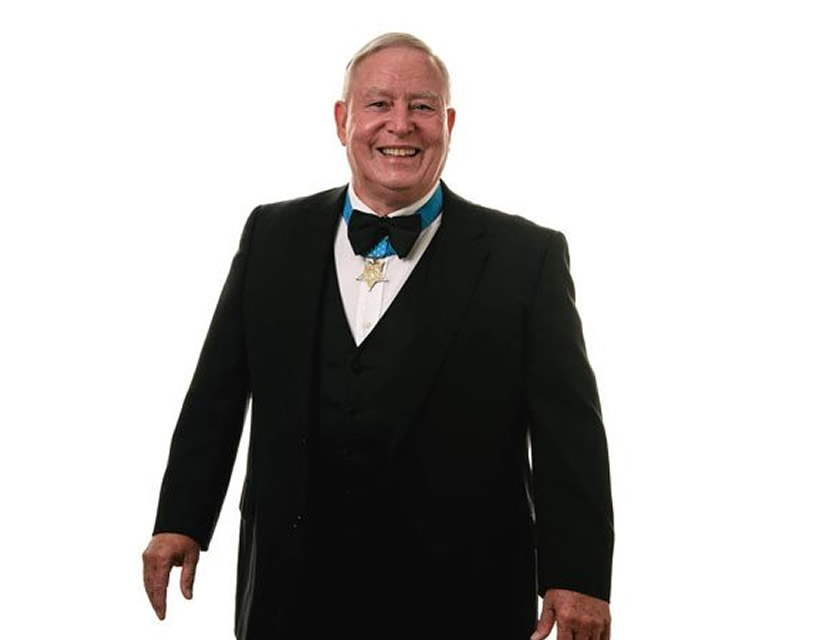
Navy Hospital Corpsman 2nd Class Donald Everett Ballard was trained to keep the Marines he was tasked with protecting alive during the Vietnam War — even at the expense of his own life. Thanks to a lucky explosives malfunction, though, Ballard survived his mission. But his actions showed the lengths he was willing to go to perform his duties, and that earned him the Medal of Honor.
Ballard was born in 1945, and raised around Kansas City, Missouri, where he still resides today.
Ballard worked in a dental laboratory after high school and said he wanted to attend college for dentistry, but he couldn’t get financial assistance to make it happen through scholarships or grants; so, he looked toward the military for educational benefits. Before joining, though, he got married and had a son and a daughter.
Ballard enlisted in the Navy on Dec. 27, 1965. Since he was interested in medicine, he became a hospital corpsman. He spent a few months working at a naval hospital in Memphis, Tennessee, before being sent to join a Marine unit at Camp Lejeune, North Carolina, in October 1966.
In December 1967, Ballard was assigned to the 3rd Battalion, 4th Marines, 3rd Marine Division and sent to Vietnam. On May 16, 1968, Ballard was attached to Company M as it moved to join more units from the 3rd Battalion, which were located near the demilitarized zone in Quang Tri Province. Ballard has just finished treating and evacuating two men suffering from heat-related issues. He was returning to his platoon from the helicopter’s landing zone when they were ambushed by a large North Vietnamese Army unit. Enemy automatic weapons and mortar blasts quickly took out a lot of men.
Ballard saw one injured Marine and ran through the heavy fire to help him. He then directed four other Marines to carry the injured man to relative safety. However, as they prepared to move out, an enemy soldier came into view, hurled a hand grenade at them and then opened fire.
Ballard shouted a quick warning to the Marines, then threw himself on top of the grenade in the hope of protecting his comrades from the blast. In doing so, Ballard surely knew he would be giving his life for the others. Amazingly, the explosive failed to detonate. When Ballard realized this, he grabbed the grenade and threw it — and it exploded in the air, injuring no one. Ballard then calmly got up and continued treating the injured.
“I don’t feel like I did anything spectacular,” Ballard said later in life. “I was wanting to do the right thing, but in all honestly, I was scared. … I paid attention to my surroundings and to survival skills as best I could, and I just did my job.”
The battle they were engaged in lasted several days. During later conflicts, Ballard was wounded a few times and eventually evacuated to Okinawa, Japan, in July 1968. Two months later, he was sent back to the U.S. to work at the Memphis naval hospital again. He left active-duty service on February 26, 1970, and transferred into the Naval Reserve.
Ballard was initially recommended for the Navy Cross for his actions, but that was upgraded to the Medal of Honor. He received the medal from President Richard M. Nixon during a White House ceremony on May 14, 1970, nearly two years to the day after he threw himself on top of that grenade.
In later years, Ballard continued to downplay the action that earned him the nation’s highest honor for valor.
“I wear this medal for all veterans that have ever served in uniform,” he said. “There were a lot of brave men out there, and most all of them earned a lot more decorations than they received. I can tell you that there’s a lot more deserving people out there than me who should have gotten the Medal of Honor.”
In late 1970, Ballard switched services to join the Kansas Army National Guard as an officer in the Medical Service Corps. He spent three decades in the Guard as an ambulance platoon leader and company commander. He served in several key positions, including starting a new medical detachment. He rose to the rank of colonel in 1998 and retired in 2000. He was inducted into the Kansas National Guard Hall of Fame in 2001.
